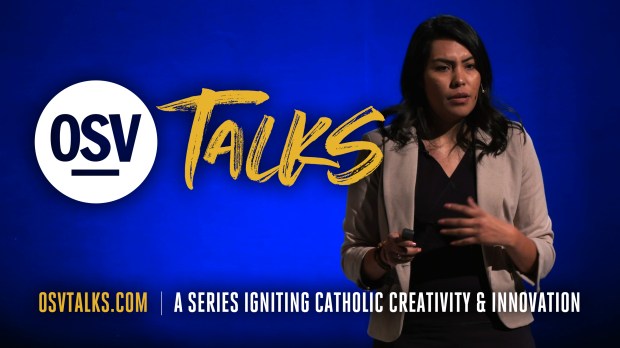It’s no secret that young people are rapidly leaving the Church: 50% of millennials raised Catholic no longer identify as Catholic today.
The reasons for this disaffiliation are varied and complex, but it’s worth considering that a different approach to youth outreach could help. That’s the idea behind Brenda Noriega’s recent OSV Talk, “Lost in Encyclical Translation” (available to watch on Vimeo and Facebook).
The video is one in a series of OSV Talks, which shine a light on creative means of evangelization, springing from the wisdom and deep prayer that energize these approaches. The talks, which are similar to TED Talks but with a Catholic focus, are free and available for anyone to watch at OSVTalks.com.
In her talk, Noriega challenges Christians to innovate or rethink the way we do ministry with young people.
“The care of the young people is not only the responsibility of the parents and youth and young adult ministers,” she said, “but it is the responsibility of every single one of us because all of us are part of the same caravan.”
If anyone knows about ministry to young people, it’s Noriega. She has an experienced perspective as a youth minister committed to accompaniment and evangelization.
“In my current professional role as Mission Educator-Promoter with Maryknoll Fathers and Brothers, I serve forming and accompanying young people as they go deeper in their discernment as missionary disciples,” Noriega said in an interview with Aleteia.
Born and raised in Mexico, Noriega came to the United States at age 17 and earned her Master’s in Pastoral Ministries from Santa Clara University. She collaborates in multiple national and international committees representing young people, including the International Youth Consultative Body for the Dicastery of Laity and Family Life and the National Advisory Board for Young Adult Ministry.
Noriega advocates for a grassroots approach to youth ministry, a strategy that Pope Francis has encouraged. To illustrate this approach, she explains several ways that Pope Francis’s words have been misunderstood when they’ve been translated into English from his native Spanish, specifically in his post-synodal apostolic exhortation, “Christus Vivit.”
These mistranslations are about so much more than semantics. Each one illustrates a major difference between Latin American culture and English-speaking culture. These mistranslations, Noriega says, reveal three approaches that “change the conversation.”
1The Caravan methodology
Noriega explains that, in Paragraph 29 of “Christus Vivit,” Pope Francis reflects on the Holy Family traveling in the Caravan to and from Jerusalem when Jesus was 12. He describes how Jesus, in his childhood, was very close to the entire community.
The Spanish version and the English version describe the Caravan differently. The English version seems to describe Jesus as “an isolated child,” Noriega said, but in the original Spanish,
Jesus knew every member in the community and the community knew him. For him, even friends and neighbors were his family … Mary and Joseph knew that they were one family with all those in the Caravan and that they would take care of Jesus as if he was their own child.
In the same way, Noriega said, we need “an urgency to become one community to serve all young people.” The formation and pastoral care of young people is not isolated to parents and youth ministers, but is the responsibility of the whole Church.
2Grassroots youth ministry
“Pope Francis tells us that those in the peripheries, those who live in the streets, those who are in prison, and even the unchurched have the same leadership potential as anyone else in ministry even without a degree or theological formation,” Noriega says. “They have already been bestowed by God with gifts and talents.”
That means we need to “open spaces” for these people to share their gifts. Let’s “give the opportunity to allow the Holy Spirit to move in them, and for them to do what the Holy Spirit is asking of them, with the gifts they already have,” she said.
3To see, to discern, to act
Finally, Noriega advocates for the “Latin American methodology” of “embracing” the dreams of young people, rather than responding with “prepackaged answers.”
This “grassroots ministry with young people,” Noriega said, “means that we walk with the young people patiently. And many times, this means that we have to break our structures, that we have to change our methodology and the ways we are accustomed to.”
“My hope is that, for those of us who accompany young people, we reconsider the way we walk with them as Pope Francis invites us to,” Noriega said. “I hope that we reach out and walk with young people in the margins, recognizing that this type of ministry is people-centered not program-centered. A process that is focused on the person is one in which we recognize the human dignity of the one we walked with.” Many more of Noriega’s insightful suggestions can be seen in her OSV Talk.
“Renewed innovation in the Church today is necessary,” she said, “because young people more than ever need to hear about the loving and merciful love of God and about a Risen Christ that will not forsake them. We have the purpose and hope they have been seeking in the wrong ways and in the wrong places.”
The key is understanding how to reach them through a grassroots approach. “They need to hear the message in their own language, platforms, and even symbols.” Young people have a special calling to renew the Church themselves, if they are given the opportunity to act according to the Holy Spirit.
“The young people are ready for a real encounter with the risen Christ and to be missionaries in their communities, salt and light in their neighborhoods, and agents of change in society,” Noriega said. “We need processes that allow them to be protagonists and not just mere receptors.”

Read more:
OSV Talks: How can we help “liturgical orphans”?

Read more:
OSV Talks: Renewing the Church from the inside out

